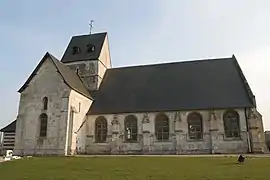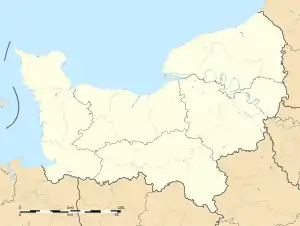Saint-Vigor-d'Ymonville | |
|---|---|
 The church in Saint-Vigor-d'Ymonville | |
Location of Saint-Vigor-d'Ymonville | |
 Saint-Vigor-d'Ymonville  Saint-Vigor-d'Ymonville | |
| Coordinates: 49°29′46″N 0°21′42″E / 49.4961°N 0.3617°E | |
| Country | France |
| Region | Normandy |
| Department | Seine-Maritime |
| Arrondissement | Le Havre |
| Canton | Saint-Romain-de-Colbosc |
| Intercommunality | Le Havre Seine Métropole |
| Government | |
| • Mayor (2020–2026) | Sandrine Lemoine[1] |
| Area 1 | 29.43 km2 (11.36 sq mi) |
| Population | 1,167 |
| • Density | 40/km2 (100/sq mi) |
| Time zone | UTC+01:00 (CET) |
| • Summer (DST) | UTC+02:00 (CEST) |
| INSEE/Postal code | 76657 /76430 |
| Elevation | 0–124 m (0–407 ft) (avg. 112 m or 367 ft) |
| 1 French Land Register data, which excludes lakes, ponds, glaciers > 1 km2 (0.386 sq mi or 247 acres) and river estuaries. | |
Saint-Vigor-d'Ymonville (French pronunciation: [sɛ̃ viɡɔʁ dimɔ̃vil]) is a commune in the Seine-Maritime department in the Normandy region in northern France.
Geography
Saint-Vigor-d'Ymonville is a farming and light industrial village, by the banks of the Seine, in the Pays de Caux, situated some 12 miles (19 km) east of Le Havre, at the junction of the D10 and D112 roads. The commune has two distinct parts: the north contains the village, farms and woodland, the south, separated by the A131 autoroute and the canal de Tancarville, has some port activity, quarrying and reclaimed marshland
Population
| Year | Pop. | ±% p.a. |
|---|---|---|
| 1968 | 571 | — |
| 1975 | 647 | +1.80% |
| 1982 | 757 | +2.27% |
| 1990 | 835 | +1.23% |
| 1999 | 859 | +0.32% |
| 2007 | 958 | +1.37% |
| 2012 | 1,066 | +2.16% |
| 2017 | 1,130 | +1.17% |
| Source: INSEE[3] | ||
Places of interest
See also
References
- ↑ "Répertoire national des élus: les maires" (in French). data.gouv.fr, Plateforme ouverte des données publiques françaises. 16 December 2022.
- ↑ "Populations légales 2021". The National Institute of Statistics and Economic Studies. 28 December 2023.
- ↑ Population en historique depuis 1968, INSEE
Wikimedia Commons has media related to Saint-Vigor-d'Ymonville.
This article is issued from Wikipedia. The text is licensed under Creative Commons - Attribution - Sharealike. Additional terms may apply for the media files.